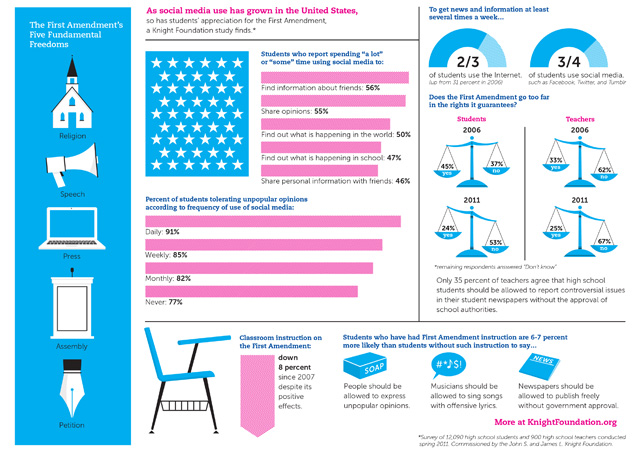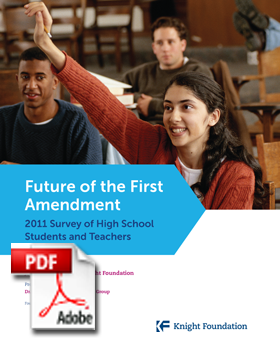
MIAMI, (Sept. 16, 2011) – While social media have been blamed for teen ills from narcissism to cyberbullying, a new study offers an inspiring perspective: as social media use has grown in the United States, so has students’ appreciation for the First Amendment. The national study was released today to coincide with the celebration of Constitution Day. It was funded by the John S. and James L. Knight Foundation.
The national study was released today to coincide with the celebration of Constitution Day. It was funded by the John S. and James L. Knight Foundation.
“This is the first generation in history that can text, tweet and blog to the whole world – it’s great news that their support is growing for the freedoms that let them do it,” said Eric Newton, senior adviser to the president of Knight Foundation. “But the bad news is that teachers aren’t nearly as excited as students about social media or student freedom.”
The Future of the First Amendment study found:
-
Both social media use and First Amendment appreciation are growing among high school students. More than three-quarters of students use social media several times a week to get news and information. Meanwhile, the percentage of students who believe “the First Amendment goes too far” in protecting the rights of citizens has dropped to a quarter (24 percent) in 2011 from nearly half (45 percent) in 2006.
-
There is a clear, positive relationship between social media use and appreciation of the First Amendment. Fully 91 percent of students who use social networking daily to get news and information agree that “people should be allowed to express unpopular opinions.” But only 77 percent of those who never use social networks to get news agree that unpopular opinions should be allowed.
-
Still, many teachers believe social media harms education. Most teachers also do not support free expression for students. Only 35 percent, for example, agree that “high school students should be allowed to report controversial issues in their student newspapers without the approval of school authorities.” In addition, teachers are more inclined to think that the emergence of the newest forms of digital media have harmed (49 percent) rather than helped (39 percent) student learning.
“For many, the First Amendment is an abstract concept, but this new study tells us that social media bring the importance of free speech home to young Americans,” said Ken Paulson, president of the First Amendment Center. “The vibrancy of worldwide communications today, fueled by social media and engaged users, is in effect exporting First Amendment values to a new and global generation.”
The study, conducted through interviews with 12,090 students and 900 teachers nationwide, was written by Dr. Kenneth Dautrich, a senior researcher at The Pert Group. It is the fourth Future of the First Amendment study done by Dr. Dautrich for Knight Foundation since 2004.
Madison Davis, a senior at Branham High School in San Jose, Calif. who took the survey, says she thinks using Facebook several times a day has given her a greater appreciation for the First Amendment and freedom of expression.
“It has taught us early on that we have a right to say whatever we want without worrying,” Madison said. “Because we have an easier outlet to express our views, we’re more likely to. All it takes is going online and typing in a post and we’ve already expressed ourselves to 400 plus people.”
Alexander Richter, a senior at Branham Senior High School, says expressing himself on social media makes him more likely to do the same in person.
“If you can go on Facebook and easily post your opinion, you appreciate your rights to do it in a protest or outside of the Internet more,” Alexander said. He recently found himself arguing online over national economic recovery plans, and felt more confident to make his case the next day in school.
“I knew what I wanted to say, I was prepared to say it, and I was already attached to the issue because of Facebook.”
As a response to the survey findings, Knight Foundation and the First Amendment Center will release a teachers’ guide to social media and the First Amendment as a way to foster discussion and appreciation for both. The guide will be unveiled at the Newseum in Washington, D.C. on Dec 15, in celebration of the Bill of Rights’ birthday.
For more information about activities celebrating the First Amendment, follow the First Amendment Center’s 1 for All campaign on Twitter @1forAllus.
For more on the Future of the First Amendment Survey, visit knightfoundation.org.
About the John S. and James L. Knight Foundation
Knight Foundation supports transformational ideas that promote quality journalism, advance media innovation, engage communities and foster the arts. The foundation believes that democracy thrives when people and communities are informed and engaged. For more, visit KnightFoundation.org.
###
Contacts:
Marc Fest, Vice President/Communications, (305) 908-2677, [email protected]
See also previous years of FoFA research: 2007 Report | 2006 Report | 2004 Report.

